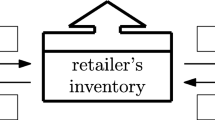Abstract
This paper discusses a two-echelon distribution-free deteriorating production-inventory newsboy model. Distinct from previous models, this study considers a deteriorating commodity with the imperfect production process. The model also considers JIT (Just In Time) deliveries and integrates the marketing and manufacturing channels. This model can be used to solve the production and replenishment problem for the manufacturer and the retailer. We derive the optimal production size, the wholesale price and the optimal number of deliveries. The model takes an insight to the defect-rate reduction. We find an upper bound for the optimal number of material’s JIT deliveries. The necessary and sufficient conditions are explored to gain managerial insights and economic implications.
Preview
Unable to display preview. Download preview PDF.
Similar content being viewed by others
References
Gallego, G., Moon, I.: The distribution-free newsboy problem–review and extensions. J. Oper. Res. Soc. 44(6), 734–825 (1993)
Lau, H.S., Lau, A.H.L.: Manufacturer’s pricing strategy and return policy for a single-period commodity. Eur. J. Oper. Res. 116, 291–304 (1999)
Lau, A.H.L., Lau, H.S.: The effects of reducing demand uncertainty in a manufacturer-retailer channel for single-period products. Comput. Oper. Res. 29, 1583–1602 (2002)
Lariviere, M.A., Porteus, E.L.: Selling to the newsvendor: an analysis of price-only contracts. Mfg. & Service Oper. Management 3(4), 293–305 (2001)
Shang, K.H., Song, J.S.: Newsvendor bounds and heuristic for optimal policies in serial supply chains. Management Sci. 49(5), 618–638 (2003)
Moon, I., Choi, S.: Distribution free newsboy problem with balking. J. Oper. Res. Soc. 46(4), 537–542 (1995)
Moon, I., Silver, E.A.: The multi-item newsvendor problem with a budget constraint and fixed ordering costs. J. Oper. Res. Soc. 51(5), 602–608 (2000)
Ghare, P.M., Schrader, S.F.: A model for exponentially decaying inventory. J. Ind. Eng. 14(5), 238–243 (1963)
Covert, R.P., Philip, G.C.: An EOQ model for items with Weibull distribution deterioration. AIIE Trans. 5, 323–326 (1973)
Raafat, F., Wolfe, P.M., Eldin, H.K.: An inventory model for deteriorating items. Comput. Ind. Eng. 20, 89–94 (1991)
Wee, H.M.: Economic production lot size model for deteriorating items with partial back-ordering. Comput. Ind. Eng. 24(3), 449–458 (1993)
Wee, H.M., Jong, J.F.: An integrated multi-lot-size production inventory model for deteriorating items. Management and System 5(1), 97–114 (1998)
Yang, P.C., Wee, H.M.: An integrated multi-lot-size production inventory model for deteriorating item. Comput. Oper. Res. 30(5), 671–682 (2003)
Nassimbeni, G.: Factors underlying operational purchasing practices: Results of a research. Int. J. Prod. Econ. 42, 275–288 (1995)
Reese, J., Geisel, R.: A comparison of current practice in German manufacturing industries. E. J. Purchasing & supply management 42, 275–288 (1997)
Lee, H.L., Rosenblatt, M.J.: Simultaneous determination of production cycle and inspection schedules in a production system. Management Sci. 33, 1125–1136 (1987)
Wang, C.H., Sheu, S.H.: Optimal lot size for products under free-repair warranty. Eur. J. Oper. Res. 149, 131–141 (2003)
Wang, C.H.: The impact of a free-repair warranty policy on EMQ model for imperfect production system. Comput Oper. Res. 31, 2021–2035 (2004)
Yeh, R.H., Ho, W.T., Teng, S.T.: Optimal production run length for products sold with warranty. Eur. J. Oper. Res. 120, 575–582 (2005)
Spiegel, M.R.: Applied differential equations. Prentice-Hall, Englewood Cliffs (1960)
Author information
Authors and Affiliations
Editor information
Editors and Affiliations
Rights and permissions
Copyright information
© 2006 Springer-Verlag Berlin Heidelberg
About this paper
Cite this paper
Wee, HM., Chung, CJ. (2006). A Two-Echelon Deteriorating Production-Inventory Newsboy Model with Imperfect Production Process. In: Gavrilova, M., et al. Computational Science and Its Applications - ICCSA 2006. ICCSA 2006. Lecture Notes in Computer Science, vol 3982. Springer, Berlin, Heidelberg. https://doi.org/10.1007/11751595_91
Download citation
DOI: https://doi.org/10.1007/11751595_91
Publisher Name: Springer, Berlin, Heidelberg
Print ISBN: 978-3-540-34075-1
Online ISBN: 978-3-540-34076-8
eBook Packages: Computer ScienceComputer Science (R0)




